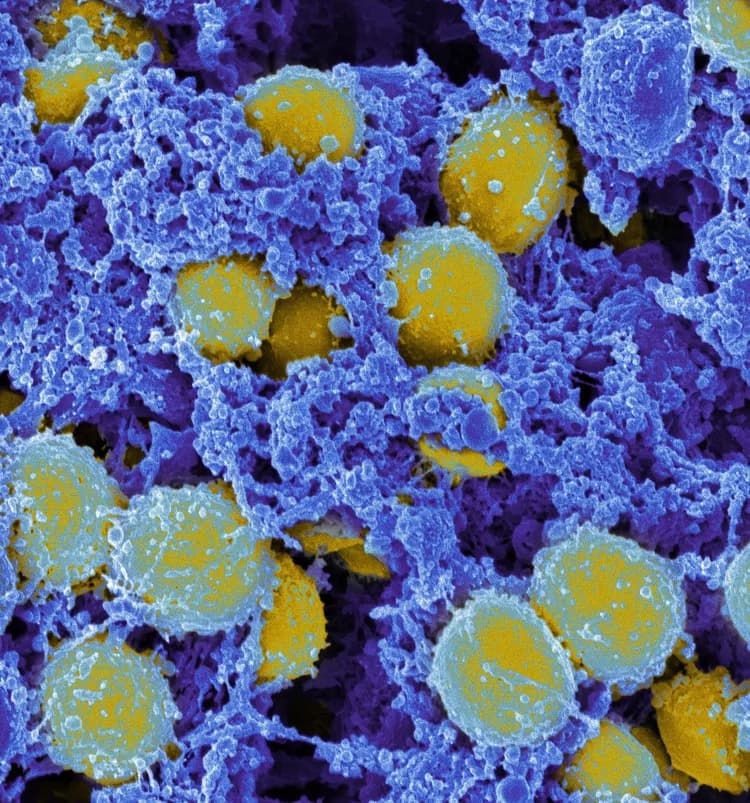Our skin is covered in millions of bacteria and most of them help keep us healthy. However, for patients with lymphoma, it may be a rather different story, as new research from the University of Copenhagen shows that toxins in the staphylococcus bacteria help cancer cells gain control over healthy cells. The Danish Cancer Society's Break Cancer Collection contributed DKK 3 million (US$0.5 million) to the research project.
Bacteria infections are more common in patients with skin lymphoma as their skin is more fragile, due to their illness. And as the illness progresses, the infections become more frequent. However, new research from the University of Copenhagen reveal that the infections may even benefit the cancer cells, because the toxins in certain staphylococcus bacteria make healthy cells produce substances that in fact advance their growth.
"We have gained important insight into the processes that activate cancer cells and make them grow. Patients' frequent bacteria infections might not be a mere side effect of the disease -- on the contrary, toxins in the bacteria actually 'benefit' cancer cells. Our next step is examining whether combating infections can slow down the growth of cancer cells and thus stop the disease," says Professor Niels Ødum from the University of Copenhagen, who, in collaboration with PhD student Andreas Willerslev-Olsen, is behind these new results that have have just been published in one of the world's leading haematology journals Blood.
The fight between cancer cells and the immune defence mechanism
The most common type of skin lymphoma is caused by the fact that specific immune cells -- CD4-T-lymphocyttes -- turn into cancer cells. They behave unnaturally and turn parasitic on the rest of the immune system. In addition to using healthy cells to do their work for them, cancer cells also slowly destroy the skin's immune defence mechanism. The new discoveries show that bacteria toxins in some patients enable cancer cells to send off signals that obstruct and change the immune defence mechanism, which would otherwise fight the cancer cells. What was believed to be an overly active immune defence mechanism could in other words turn out to be a malignant infection brought on by bacteria, which only worsens the disease.
Skin lymphoma is a rare type of cancer. Annually, approx. 50 people in Denmark are diagnosed with the disease, which is often confused with eczema or other benign skin diseases, which is why it sometimes takes years to reach the proper diagnosis. In most patients, the disease will stay inactive for years, while in others, it will suddenly erupt and turn into an aggressive and life threatening cancer.
So far, researchers have no knowledge of what causes skin lymphoma or why it suddenly becomes very aggressive in some patients. It is a continual fight between growing cancer cells and an immune defence mechanism that tries to contain the disease by obstructing and killing the cancer cells.
Scientist at the University of Copenhagen and Skejby Hospital will continue their work on how bacteria might affect the balance between the immune defence mechanism and the disease. In the long term, their aim is to understand how bacteria and their toxins can worsen cancer -- knowledge that may also be used to develop new targeted treatments. As only some of the bacteria produce toxins, it is important to also increase knowledge about and develop methods to locate exactly those patients who may benefit form treatment with antibiotics.
The above post is reprinted from materials provided by University of Copenhagen The Faculty of Health and Medical Sciences. Note: Materials may be edited for content and length.
Disclaimer: DoveMed is not responsible for the adapted accuracy of news releases posted to DoveMed by contributing universities and institutions.
Primary Resource:
Willerslev-Olsen, A., Krejsgaard, T., Lindahl, L. M., Litvinov, I. V., Fredholm, S., Petersen, D. L., ... & Wasik, M. A. (2016). Staphylococcus aureus enterotoxin A (SEA) stimulates STAT3 activation and IL-17 expression in cutaneous T-cell lymphoma. Blood, blood-2015.
Related Articles
Test Your Knowledge
Asked by users
Related Centers
Related Specialties
Related Physicians
Related Procedures
Related Resources
Join DoveHubs
and connect with fellow professionals


0 Comments
Please log in to post a comment.